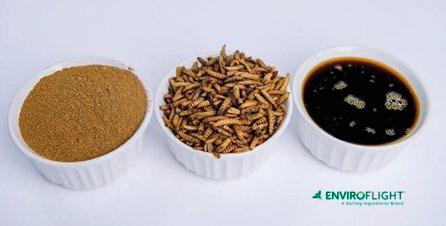
1 minute read
BENEFITS OF USING BLACK SOLDIER FLY (HERMETIA ILLUCENS) LARVAE IN LIVESTOCK DIETS
Bree
Modica,
MS; Liz Koutsos, PhD
EnviroFlight, LLC 2100 Production Drive, Apex, NC 27539
Introduction To Black Soldier Fly Larvae
The black soldier fly (Hermetia illucens, BSF) has received significant attention in the past decade or more due to the capacity of the larvae to upcycle low-value feed inputs and divert those inputs from landfills or other less sustainable options.
Additionally, BSF is found on all continents except Antarctica and is thus not considered an invasive species.
They present little risk of zoonotic disease and can actually reduce the presence of harmful bacteria and houseflies in various substrates.
This insect is highly environmentally sustainable, requiring mere fractions of the inputs (feed, land, water, energy) used to produce traditional animalbased ingredients and emitting far fewer greenhouse gases.
The finished products of BSF larvae (BSFL) rearing include: partially defatted, protein-rich BSFL meal dried BSFL BSFL oil

BSFL-based ingredients are becoming widely accepted and utilized in both livestock feeds and pet foods. The nutrient composition of BSFL ingredients is shown in Table 1
Table 1. Nutrient composition and AA digestibility (in parentheses) of three BSFL ingredients.
*EnviroFlight, LLC internal data; ^Total fatty acids, calculated








